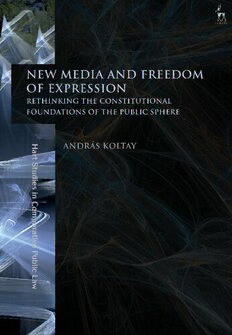
New Media and Freedom of Expression: Rethinking the Constitutional Foundations of the Public Sphere PDF
281 Pages·2019·5.136 MB·English
Most books are stored in the elastic cloud where traffic is expensive. For this reason, we have a limit on daily download.
Preview New Media and Freedom of Expression: Rethinking the Constitutional Foundations of the Public Sphere
Description:
The principles of freedom of expression have been developed over centuries. How are they preserved and passed on? How can large internet gatekeepers be required to respect freedom of expression and to contribute actively to a diverse and plural marketplace of ideas? These are key issues for media regulation, and will remain so for the foreseeable decades. The book starts with the foundations of freedom of expression and freedom of the press, and then goes on to explore the general issues concerning the regulation of internet as a specific medium. It then turns to analysing the legal issues relating to the operations of the three most important gatekeepers (ISPs, search engines and social media platforms) that affect freedom of expression. Finally it summarises the potential future regulatory and media policy directions. The book takes a comparative legal approach, focusing primarily on English and American regulations, case law and jurisprudential debates, but it also details the relevant international (Council of Europe, European Union) developments, as well as the jurisprudence of the European Court of Human Rights.Volume 25 in the series Hart Studies in Comparative Public Law
See more
The list of books you might like
Most books are stored in the elastic cloud where traffic is expensive. For this reason, we have a limit on daily download.
